
2012 Stamp Issues
5th Jan 2012 - Olympics and Paralympics Stamp Booklet
Tues 10th Jan 2012 - Roald Dahl
20th January 2012, year of the Dragon, Smilers Sheet.
Thurs 2nd Feb 2012- The House of Windsor
6th February - Diamond Jubilee
Thurs 23rd Feb 2012 - Britons of Distinction
Thurs 8th March 2012 - Classic Locomotives of Scotland
Tuesday 20th March 2012 - Comics
Tuesday 10th April 2012 - UK A-Z Part 2
Tues 15th May 2012 - Great British Fashion
Thurs 31st May 2012 - The Diamond Jubilee
Tues 19th June 2012 - Charles Dickens
Tues 27th July 2012 - Olympic Games Welcome
Wed 29th August 2012 - Paralympic Games Welcome
Thurs 27th Sept 2012 - Olympic & Paralympic Games Memories
Tues 16th Oct 2012 - Dinosaurs
Tues 30th Oct 2012 - Space Science
Tues 6th Nov 2012 - Christmas
Britons of Distinction
Issue Date - 23rd February 2012
Britons of Distinction celebrates another selection of distinguished individuals from the realms of science and technology, architecture, politics and the arts, who are all celebrating anniversaries in 2012.
These Britons were born with very different gifts, but they shared a determination to follow them. Rubbing shoulders with the architects and musicians are the social reformer, the ironmonger from a small Devon town who changed the history of engineering, the craftswoman, the brilliant mathematician, the secret agent and the Cambridge don who created some of the most terrifying ghost stories ever written.
The last time Royal Mail brought together ten different individuals and their achievements was with Eminent Britons in 2009. This was one of the most popular issues of that stamp year and came about when Royal Mail discovered a number of important, but unrelated, anniversaries.
Initial research for 2012 soon demonstrated that, once again, there were many significant anniversaries allowing Royal Mail to assemble a distinguished list of those celebrating birthdays and anniversaries of specific achievements in 2012.
Issue Products
|
|
Stamp SetFeaturing portraits of five of our distinguished subjects and depictions of the other five’s greatest achievements. Sir Basil Spence created Coventry Cathedral amongst other fine buildings. Born to German parents in Yorkshire, Frederick Delius composed some of the most quintessentially English pieces in the pastoral canon. Daughter of the artist William Morris, Mary Morris was a leading light in the revival of English embroidery. Odette Hallowes was the first woman to win the George Cross. Thomas Newcomen, a Devon ironmonger and engineer, invented the atmospheric steam engine that helped to power the Industrial Revolution. Kathleen Ferrier was the greatest contralto of her era. Augustus Pugin was a great champion and exponent of Gothic architecture with the glorious interiors of Palace of Westminster among his many achievements. Montague Rhodes James, author of some of the most chilling ghost stories in British fiction. Alan Turing, a mathematician and computer scientist, whose work creating the Bombe code braking machine, was instrumental in saving millions of lives in WWII. Quaker, pacifist and social reformer, Joan Mary Fry was a tireless campaigner for the oppressed. |
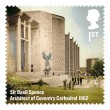 |
1st Class - Sir Basil Spence – architect of Coventry CathedralKnighted for services to architecture, particularly his designs for the new Coventry Cathedral, opened in 1962, after the original was bombed. The image shows Coventry Cathedral. |
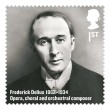 |
1st Class – Frederick Delius - opera, choral and orchestral composerYorkshire-born composer of choral and orchestral works, most renowned for music evoking a timeless English pastoral idylll. |
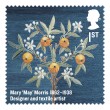 |
1st Class – Mary ‘May’ Morris – designer and textile artistTextile artist and designer celebrated for her embroidery; daughter of the artist and thinker William Morris. The image shows Orange Tree, designed and embroidered by May Morris.
|
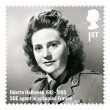 |
1st Class – Odette Hallowes – SOE agent in occupied FranceFrench-born British secret agent in wartime France who survived solitary confinement in German concentration camps.
|
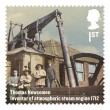 |
1st Class – Thomas Newcomen – inventor of the atmospheric steam engineDevon ironmonger, engineer and inventor of the atmospheric steam engine, which helped power the Industrial Revolution. His first working engine was installed at a coal mine near Dudley Castle in Staffordshire in 1712. |
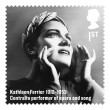 |
1st Class – Kathleen Ferrier – contralto performer of opera and songLancashire-born contralto whose international opera and song career was prematurely ended by her death from cancer.
|
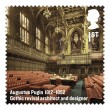 |
1st Class – Augustus Pugin – Gothic revival architect and designerArchitect, designer and advocate of the Gothic style whose commissions included the interiors of the Palace of Westminster. The stamp shows Pugin’s interior of the Palace of Westminster.
|
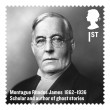 |
1st Class – Montague Rhodes James – scholar and author of ghost storiesCambridge academic and author of chilling ghost stories, originally written as entertainments for his friends. |
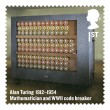 |
1st Class – Alan Turing – mathematician and code breakerMathematician and computer scientist, whose work with the code-breakers at Bletchley Park helped to speed up the end of the Second World War. The stamp shows Turing’s Bombe code breaking machine at Bletchley Park. |
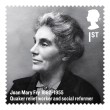 |
1st Class – Joan Mary Fry – Quaker relief worker and social reformerQuaker campaigner for pacifism and social reform who organised food relief in Germany after the First World War and then in Wales. |
Technical Details
| Feature |
Type/Detail |
| Number of stamps | Ten |
| Design | Purpose |
| Illustration/photography | Sir Basil Spence – photo of Coventry Cathedral © Edwin Smith/RIBA Library Photographs Collection; Frederick Delius © Delius Trust; Mary ‘May’ Morris – Orange Tree embroidery © William Morris Society, photo by Peter Wood; Odette Hallowes © Imperial War Museum; Thomas Newcomen – photo from the collections of Glasgow Museums © Culture and Sport Glasgow (Trading) CIC; Kathleen Ferrier – photo by Angus McBean © Harvard Theatre Collection, Houghton Library, Harvard University; Augustus Pugin – photo of House of Lords © Science & Society Picture Library; Montague Rhodes James © National Portrait Gallery, London; Alan Turing – reconstructed Bombe machine used by permission of Bletchley Park, photo by Peter Wood; Joan Mary Fry © Religious Society of Friends in Britain. |
| Stamp Format | Square |
| Stamp Size | 35mm x 35mm |
| Printer | Cartor Security Printing |
| Print Process | Lithography |
| Number per Sheet | 25/50 |
| Perforations | 14.5 x 14.5 |
| Phosphor | All over |
| Gum | PVA |

designed by KMcS, Dec 2009
